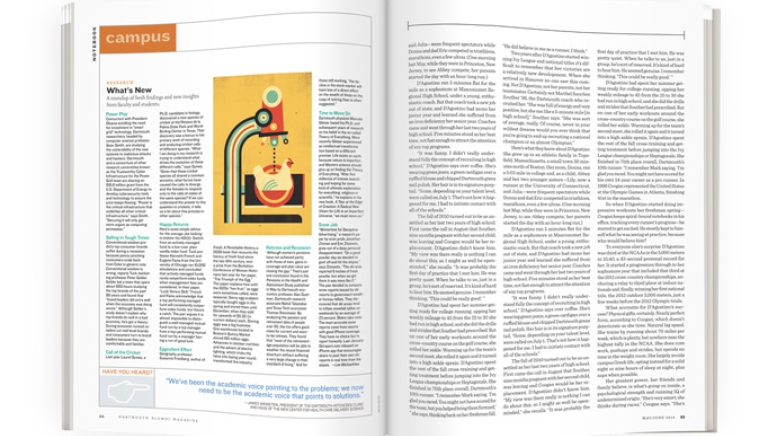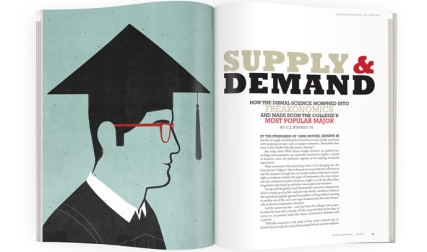Power Play
Concurrent with President Obama extolling the need for investment in “smart grid” technology, Dartmouth researchers, headed by computer science professor Sean Smith, are studying the vulnerability of the new systems to malicious attacks and hackers. Dartmouth and a consortium of other research universities known as the Trustworthy Cyber Infrastructure for the Power Grid team are sharing an $18.8 million grant from the U.S. Department of Energy to develop cybersecurity tools and technology to ensure the juice keeps flowing. “Power is the critical infrastructure that underlies all other critical infrastructure,” says Smith. “Securing it will only get more urgent as computing permeates.” LINK
Selling in Tough Times
Conventional wisdom predicts top consumer brands suffer during a recession because penny-pinching consumers scale back from Coke to generic cola. Conventional wisdom is wrong, reports Tuck marketing professor Peter Golder. Golder led a team that spent about 900 hours studying the top brands of the past 90 years and found that “brand leaders did extra well when the economy was doing worse.” Although Golder’s study doesn’t explain why top brands do well in a bad economy, he’s got a theory: During economic turmoil retailers cut mid-level brands, and consumers turn to brand leaders because they are comfortable and familiar. LINK
Call of the Cricket
Last year Laurel Symes, a Ph.D. candidate in biology, discovered a new species of cricket at the Resaca de la Palma State Park and World Birding Center in Texas. That discovery was a bonus to her primary work of recording and analyzing cricket calls of different species. “What I am doing in my research is trying to understand what drives the evolution of these different calls,” says Symes. “Given that these cricket species all shared a common ancestor, what forces have caused the calls to diverge and the females to respond only to the calls of males of the same species? If we can understand the answer to this question in crickets, it tells us a lot about this process in other species.” LINK
Happy Returns
Here’s some simple advice for the average Joe looking to bolster his 401(k): Switch from an actively managed fund to a low-cost, plain vanilla index fund. Tuck professor Kenneth French and Eugene Fama from the University of Chicago ran 10,000 simulations and concluded that actively managed funds rarely outperform index funds when management fees are considered. In their paper, “Luck Versus Skill,” French and Fama acknowledge that a top performing managed fund will consistently outperform index funds, but there’s a catch. The pair argues it is almost impossible to distinguish a well-managed mutual fund run by a top manager from a top-performing mutual fund run by a manager having a run of good luck. LINK
Eggcellent Effort
Geography professor Susanne Freidberg, author of Fresh: A Perishable History, a 2009 book that recounts the history of fresh food since the late 19th century, won a prize from the Berkshire Conference of Woman Historians last year for her paper, “The Triumph of the Egg.” The paper explains how until the 1920s “hen fruit,” as eggs were sometimes called, were seasonal. Savvy egg scalpers typically bought eggs in the spring and stored them until December, when they sold for upwards of $5.30 (in current dollars) each. Storing eggs was a big business. One warehouse located in Boston’s Quincy Market stored 150 million eggs. Advances in chicken nutrition and the advent of electric lighting, which tricks the hens into laying year-round, transformed the industry. LINK
Retirees and Recession
“Although women’s pensions have not achieved parity with those of men, gains in coverage and plan value are closing the gap.” That’s just one conclusion found in the Pensions in the Health and Retirement Study published in May by Dartmouth economics professor Alan Gustman, Dartmouth research associate Nahid Tabatabai and Texas Tech economist Thomas Steinmeier. By analyzing the pension and retirement data of people over 50, the trio offers good news for current and soon-to-be retirees. They found that “most of the retirement-age population will be able to weather the recent financial downturn without suffering a very large change in their standard of living.” And for those still working, “the decline in the stock market will have less of a direct effect on the wealth of those on the cusp of retiring than is often suggested.” LINK
Time to Move On
Dartmouth physicist Marcelo Gleiser based his Ph.D. and subsequent years of research on his belief in the so-called Theory of Everything. More recently Gleiser experienced an intellectual transformation based on a different premise: Life exists on earth because nature is imperfect and Western science should give up on finding the Theory of Everything. “After five millennia of intense searching and hoping for some kind of ultimate explanation for everything, religious or scientific,” he explains in his new book, A Tear at the Edge of Creation: A Radical New Vision for Life in an Imperfect Universe, “we must move on.” LINK
Snow Job
“Wintertime for Deceptive Advertising,” a research paper by econ profs Jonathan Zinman and Eric Zitzewitz, grew out of a deep personal disappointment. “On a good powder day we decided to goof off and hit the slopes,” says Zitzewitz. “The ski area reported 6 inches of fresh powder, but when we got there it was more like 2.” The pair decided to compare snow reports issued by ski resorts to government weather bureau tallies. They discovered that ski areas tend to inflate snowfall tallies on weekends by an average of 23 percent. Skiers take note: The most accurate snow reports come from resorts with good iPhone coverage. They have no choice but to report honestly. Last January Skireport.com released an iPhone app that encourages skiers to post their own ski reports in real time from the slopes. LINK
—Lee Michaelides




